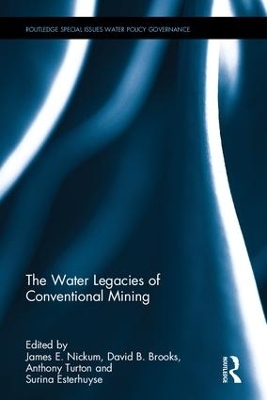
The Water Legacies of Conventional Mining
Routledge (Verlag)
978-1-138-28871-3 (ISBN)
The impact of mining is too big to ignore in a world of oversubscribed water. This is true of conventional mining as much as – or even more than – hydraulic fracturing (fracking). The legacy issues of such mining on water have not been fully appreciated, especially the irretrievable effects mining has had on communities and ecosystems around the world through its impact on water. Yet this is not an ‘us-or-them’ problem: the wealth, influence and technical knowledge of mining interests can and must be part of the solution. All of the contributions to this volume either consider the deficiencies of existing governance structures and the need for better ones, or explore the use of new techniques to identify and evaluate social and environmental impacts.
The chapters in this book were originally published in the journal Water International.
James E. Nickum is an institutional economist, affiliated with the Centre for Water and Development at SOAS, UK, and the University of Hong Kong. David B. Brooks is a natural resource economist working mainly in North America and the Middle East; he is affiliated with the International Institute for Sustainable Development in Manitoba, Canada. Anthony Turton is a water strategist in both the academic and commercial world, affiliated with the Centre for Environmental Management at the University of Free State, Bloemfontein, South Africa. Surina Esterhuyse is a geohydrologist working on oil and gas extraction in South Africa, and affiliated with the Centre for Environmental Management at the University of Free State, Bloemfontein, South Africa.
1. Introduction David B. Brooks, James E. Nickum, Anthony Turton and Surina Esterhuyse 2. Untying the Gordian Knot: unintended consequences of water policy for the gold mining industry in South Africa Anthony Turton 3. Mine site water-reporting practices, groundwater take and governance frameworks in the Hunter Valley coalfield, Australia Wendy Timms and Cameron Holley 4. Non-discrimination and liability for transboundary acid mine drainage pollution of South Africa’s rivers: could the UN Watercourses Convention open Pandora’s mine? Rémy Kinna 5. A pilot study of the Social Water Assessment Protocol in a mining region of Ghana Anastasia N. Danoucaras, Alidu Babatu Adam, Kathryn Sturman, Nina K. Collins and Alan Woodley 6. Unconventional oil and gas extraction in South Africa: water linkages within the population–environment–development nexus and its policy implications Surina Esterhuyse, Nola Redelinghuys and Marthie Kemp 7. Lessons from Yanacocha: assessing mining impacts on hydrological systems and water distribution in the Cajamarca region, Peru Diana Vela-Almeida, Froukje Kuijk, Guido Wyseure and Nicolas Kosoy 8. Disputes over land and water rights in gold mining: the case of Cerro de San Pedro, Mexico Didi Stoltenborg and Rutgerd Boelens 9. Mining and campesino engagement: an opportunity for integrated water resources management in Ancash, Peru Robert Patrick and Lalita Bharadwaj 10. Questioning the effectiveness of planned conflict resolution strategies in water disputes between rural communities and mining companies in Peru Milagros Sosa and Margreet Zwarteveen 11. Predicting water quality associated with land cover change in the Grootdrai Dam catchment, South Africa Anja du Plessis, Tertius Harmse and Fethi Ahmed 12. Assessing the existing knowledge base and opinions of decision makers on the regulation and monitoring of unconventional gas mining in South Africa Surina Esterhuyse, Marthie Kemp and Nola Redelinghuys
| Erscheinungsdatum | 12.07.2017 |
|---|---|
| Reihe/Serie | Routledge Special Issues on Water Policy and Governance |
| Verlagsort | London |
| Sprache | englisch |
| Maße | 174 x 246 mm |
| Gewicht | 453 g |
| Themenwelt | Naturwissenschaften ► Biologie ► Ökologie / Naturschutz |
| Naturwissenschaften ► Geowissenschaften ► Hydrologie / Ozeanografie | |
| Sozialwissenschaften ► Politik / Verwaltung | |
| Technik ► Bergbau | |
| Technik ► Umwelttechnik / Biotechnologie | |
| ISBN-10 | 1-138-28871-3 / 1138288713 |
| ISBN-13 | 978-1-138-28871-3 / 9781138288713 |
| Zustand | Neuware |
| Haben Sie eine Frage zum Produkt? |
aus dem Bereich


